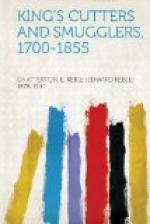they could always fetch a big price, and the share
for the smugglers themselves was by no means inconsiderable.
But it is always the case that, when large profits
are made by lawless, reckless people, these proceeds
are as quickly dissipated in extravagance of living.
It is sad to think that these seafaring men, who possessed
so much grit and pluck, had such only been applied
in a right direction, actually died paupers.
As one reads through the pitiful petitions, written
on odd scraps of paper in the most illiterate of hands
begging for clemency on behalf of a convicted smuggler,
one can see all too clearly that on the whole it was
not the actual workers but the middle-men who, as
is usually the case, made the profits. A life
of such uncertainty and excitement, an existence full
of so many hairbreadth escapes did not fit them for
the peaceful life either of the fisherman or the farmer.
With them money went as easily as it had come, and
taking into account the hardness of the life, the risks
that were undertaken, the possibility of losing their
lives, or of being transported after conviction, it
cannot be said that these men were any too well paid.
Carelessness of danger led to recklessness; recklessness
led on to a life that was dissolute and thriftless.
And in spite of the fact that these tear-stained appeals
were usually signed by all the respectable inhabitants
of the seaside village—the rector, the
local shipbuilder, Lloyds’ shipping agent, the
chief landowners and so forth—many a wife
and family had to starve or become chargeable to the
Union, while the breadwinner was spending his time
in prison, serving as an impressed sailor on board
one of his Majesty’s ships against the enemy;
or, if he had been found physically unfit for such
service, condemned to seven or more years of transportation.
But by the year 1745 smuggling had reached such a
pitch that something had to be done. The country
was in such a state of alarm and the honest traders
made such bitter complaints of the disastrous effect
which these illicit practices were having on their
prosperity that, on the 6th of February in that year,
a Parliamentary Committee was formed “to inquire
into the causes of the most infamous practice of smuggling
and consider the most effectual methods to prevent
the said practice.” For it was clear that
in spite of all that had been done by the Customs
and Excise, by the Admiralty and the military, they
had not succeeded in obtaining the desired effect.
And during the course of this inquiry a great deal
of interesting evidence came out from expert witnesses,
some of whom had not long since been the greatest
smugglers in existence, but had come forward and received
the pardon of the State. We may summarise the
testimony obtained by this Committee as follows.
The smugglers, after sailing away from England, used
to purchase the tea abroad sometimes with money but
at other times with wool. That was a serious matter
in either alternative if, as was the case, the transactions




